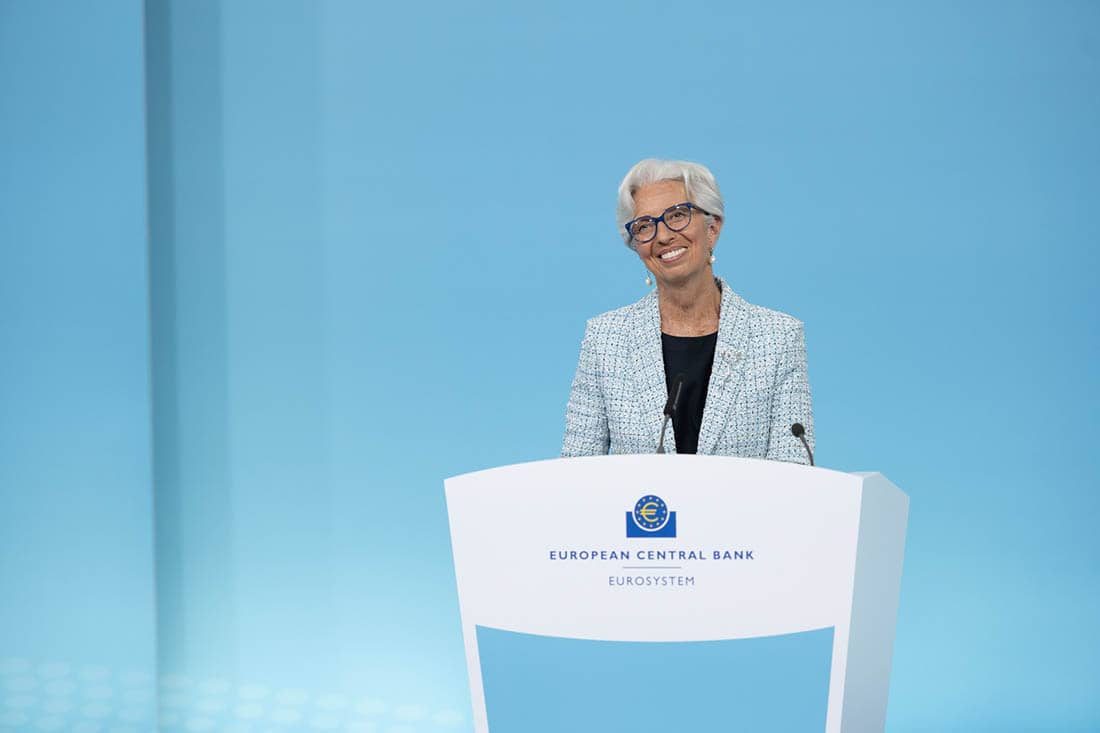Euro Eases from Highs as ECB Hints March Hike Could be its Last
- ECB hikes 50bp, promises more
- Euro maintains strength
- But March could be the final hike
- Which could prompt rerating in money markets
- And eventually weigh on Euro

Above: File image of ECB President Christine Lagarde. Image: Andreas Reeg/ECB.
The European Central Bank committed to further "significant" interest rate increases as it seeks to combat inflation, however, parts of the guidance offer signs that a final 'big' push in March could yet see the final hike in the cycle.
The ECB hiked by 50 basis points on Thursday and said in a statement it "expects to raise the further", which is what markets were expecting heading into the February 02 decision.
"The Governing Council will stay the course in raising interest rates significantly at a steady pace and in keeping them at levels that are sufficiently restrictive to ensure a timely return of inflation to its 2% medium-term target," said the central bank in a statement.
The Pound to Euro exchange rate (GBP/EUR) was under pressure heading into the ECB decision which came shortly after a Bank of England decision to hike by a similar margin.
The commitment by the ECB to "significant" rate hikes contrasts with guidance from the Bank of England which today dropped a commitment to respond "forcefully" to inflation in future decisions.
"This is the highest in all the time that core inflation has been in our part of the world. So, I get it, headline inflation has gone down ... but underlying inflation pressure is there, alive and kicking, which is why we are committing as we intend in this monetary policy statement, and this is why I say we have more ground to cover, and we are not done," said ECB President Christine Lagarde when addressing the press.
For the ECB "significant" is consistent with a further 50bp hike while for the Bank of England, "forceful" is the keyword which equates to such a move.
Therefore, the language suggests the ECB is likely to 'out-hike' the BoE in the coming months, which would potentially keep GBP/EUR under pressure.
So far, so bullish for the Euro.
But the thrust of the communication soon became muddled, says Davide Oneglia, an economist at TS Lombard.
He says a few remarks in the policy statement such as that in March the ECB will "evaluate the subsequent path of monetary policy" and that "risks to the inflation outlook have become more balanced, especially in the near term" were prone to be interpreted in a dovish light by investors.
"Christine Lagarde's confusing answers in the Q&A about the ECB's reaction function and direction of policy beyond March proved a failure," he adds. "As a result, markets trimmed estimates of the peak rate and priced in 20bps more of ECB cuts as early as December 2023."
The January guidance therefore ultimately opened the door for some questions to be raised regarding the outlook for ECB rates beyond March.
This line in the statement is of particular interest:
"Governing council intends to raise interest rates another 50bp in March and then evaluate the subsequent path of its monetary policy."
It suggests there is only one further hike remaining in the cycle, which would imply the terminal rate will land lower than the market was anticipating heading into today's event.
If the market brings down rate expectations over the coming days it could deflate the Euro and implies the gap between the ECB and BoE is actually smaller than originally thought.
This could support GBP/EUR over the coming weeks following a soft start to 2023.
Above: GBP/EUR chart showing a turn in direction following the ECB update. (Consider setting a free FX rate alert here to better time your payment requirements.)
At the time of writing GBP/EUR spot is at 1.1228, bank transfer rates are at approximately 1.10, competitive cash and holiday money rates are at ~1.11 and competitive transfer rates are at ~1.1190.
"We flagged the turn in US inflation mid-2022 and were proven right. Slowing inflation allowed the Fed to do a dovish pivot, driving USD lower. Now it's the ECB's turn. The same slowing in inflation is playing out in the Eurozone. Euro will fall," says Robin Brooks, Chief Economist at the IIF and former Chief FX Strategist at Goldman Sachs.
The Euro entered February as 2023's second-best performing currency as investors see the ECB pursuing an aggressive path of rate hikes, just as other central banks look to slow down.
But the Euro could be left vulnerable to a retracement if the ECB 'out hiking' narrative is challenged, particularly as the pace of the Euro's recent advance leaves it looking extended against some currencies.
including the Pound, which could limit its upside in the near term, particularly The Euro rose sharply in December after the ECB stated it was ready to step up its fight against inflation with a number of 50bp rate hikes, surprising investors and prompting markets to lift expectations for the ECB's terminal interest rate settings.


